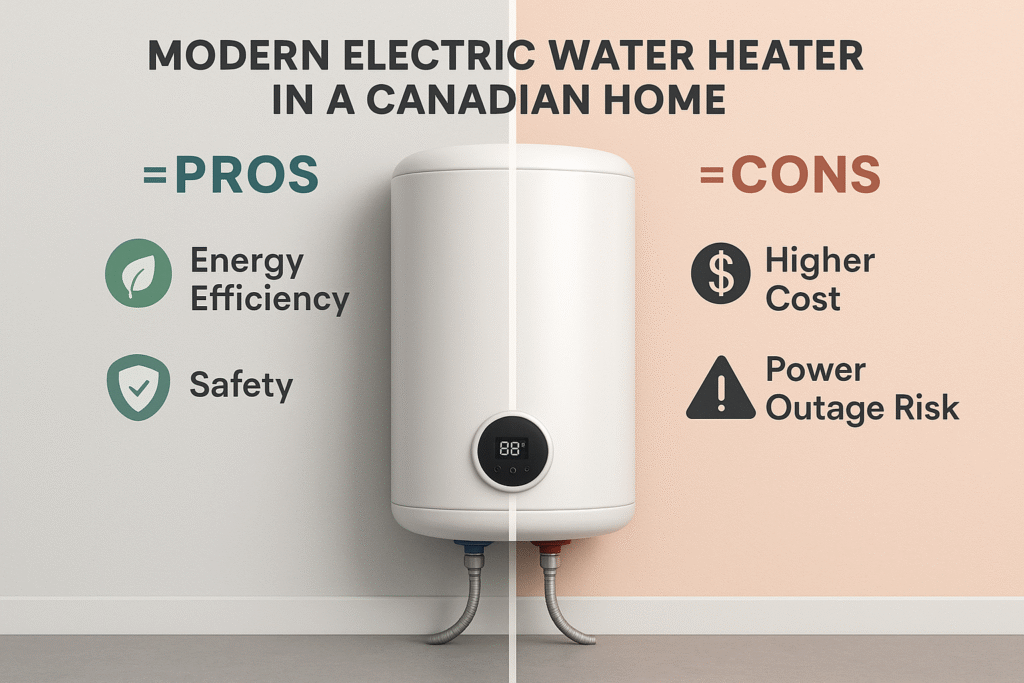Choosing the right water heater is a crucial decision for Canadian homeowners and businesses, especially given our harsh winters and the need for reliable hot water year-round. In this comprehensive guide, we’ll explore the top pros and cons of electric water heaters—the main keyword for this post—so you can make an informed choice for your property. We’ll also highlight expert insights from GM HEATING AND COOLING INC, a trusted name in Canadian HVAC solutions.
Supporting keywords used: electric hot water heater, electric tankless water heater, water heater efficiency, electric vs gas water heater.
The Top Pros and Cons Of Electric Water Heaters: What Are Electric Water Heaters?
An electric water heater is a device that uses electrical energy to heat water for residential or commercial use. These systems are available in various forms, including traditional tank-based models and newer electric tankless water heaters, which heat water on demand. In Canada, electric water heaters are popular due to their reliability, safety, and ease of installation, making them a common choice for both homes and businesses.
The Top Pros and Cons Of Electric Water Heaters: The Top Pros
Energy Efficiency
One of the most significant advantages of electric water heaters is their energy efficiency. Modern electric water heaters convert nearly all the electricity they use into heat, resulting in minimal energy loss compared to gas models, which lose heat through venting. This high efficiency can translate into lower energy consumption and more predictable utility bills, especially in regions with stable or lower electricity rates.
Lower Initial Cost
Electric water heaters generally have a lower upfront cost than gas water heaters. Not only are the units themselves more affordable, but installation is also simpler and less expensive because there is no need for gas lines or venting. For homeowners and businesses looking for a budget-friendly solution, electric water heaters offer an attractive entry point.
Easy Installation and Maintenance
Installation of electric water heaters is straightforward: they require no venting, no gas lines, and minimal modifications to your property. This simplicity results in faster installations and reduced labor costs. Maintenance is also easier, with fewer components to service and no risk of pilot light issues or gas leaks.
Safety and Reliability
Electric water heaters are considered safer than their gas counterparts because they do not rely on combustible fuels. There’s no risk of gas leaks or carbon monoxide poisoning, making them a reliable choice for families and businesses focused on safety. Their simpler design also means fewer breakdowns and a longer lifespan with proper care.
Consistent Performance in Cold Climates
For Canadian households, reliable hot water during winter is essential. Electric water heaters perform consistently regardless of outdoor temperatures, making them particularly well-suited for our climate117.
Compatibility with Renewable Energy
Electric water heaters can be paired with renewable energy sources like solar panels. This integration allows homeowners to use clean energy for water heating, reducing both utility bills and environmental impact.
The Top Pros and Cons Of Electric Water Heaters: The Top Cons
Higher Operating Costs in Some Regions
While electric water heaters are efficient, electricity rates in some parts of Canada can be higher than natural gas. Over time, the operating costs of an electric water heater may surpass those of a gas model, especially in provinces where electricity is expensive. It’s important to compare local energy rates before making a decision.
Slower Heating and Recovery Times
Electric water heaters generally take longer to heat water compared to gas models. This slower recovery rate can be a drawback for larger families or businesses with high hot water demands, as it may lead to waiting periods between uses. If you require large volumes of hot water quickly, a gas or high-capacity electric tankless water heater may be a better fit.
Vulnerability to Power Outages
Electric water heaters depend entirely on the electrical grid. During a power outage, these units will not function, potentially leaving you without hot water when you need it most. In regions prone to outages, this is a critical factor to consider.
Limited Hot Water Supply (for Tank Models)
Traditional tank-based electric water heaters have a finite hot water supply. Once the tank is depleted, you must wait for it to reheat, which can be inconvenient during periods of high demand. While electric tankless water heaters offer on-demand heating, they are typically more expensive upfront.
The Top Pros and Cons Of Electric Water Heaters: Key Factors to Consider
When deciding whether an electric water heater is right for your home or business, consider the following:
- Local Energy Rates: Compare the cost of electricity and natural gas in your area.
- Hot Water Demand: Assess your household or business’s peak hot water usage.
- Installation Space: Electric models are often more compact, ideal for smaller spaces.
- Safety Requirements: Electric units are safer, especially in homes with children or elderly residents.
- Backup Power Solutions: In areas prone to outages, consider a backup generator or alternative heating method.
The Top Pros and Cons Of Electric Water Heaters: Incentives and Rebates in Canada
Canadian homeowners and businesses may be eligible for rebates and incentives when upgrading to energy-efficient electric water heaters, especially heat pump water heaters. For example, in British Columbia, the CleanBC Better Homes Energy Savings Program offers rebates of up to $3,500 for qualifying heat pump water heater installations. These incentives can significantly offset the cost of upgrading and encourage the adoption of more efficient, environmentally friendly systems.
The Top Pros and Cons Of Electric Water Heaters: Electric vs Gas Water Heater Comparison
| Feature | Electric Water Heater | Gas Water Heater |
|---|---|---|
| Upfront Cost | Lower purchase and installation cost | Higher due to venting and gas line requirements |
| Operating Cost | Can be higher if electricity rates are high | Often lower if natural gas is cheap |
| Efficiency | Very high (minimal energy loss) | Lower (energy lost through venting) |
| Safety | No risk of gas leaks or carbon monoxide | Requires careful installation and monitoring |
| Maintenance | Simple, fewer components | More complex, requires venting and gas checks |
| Performance in Outages | No hot water during power outages | Can function during outages (with pilot light) |
| Environmental Impact | Can use renewable electricity | Produces greenhouse gases |
The Top Pros and Cons Of Electric Water Heaters: Tips for Maximizing Efficiency
- Insulate Pipes and Tank: Reduce heat loss by insulating your water heater and nearby pipes6.
- Set the Right Temperature: Keep your water heater between 60°C and 65°C for safety and efficiency.
- Choose ENERGY STAR Models: Look for high-efficiency models to maximize savings and qualify for rebates.
- Regular Maintenance: Schedule annual check-ups with professionals like GM HEATING AND COOLING INC to keep your system running optimally.
The Top Pros and Cons Of Electric Water Heaters: Why Choose GM HEATING AND COOLING INC?
When it comes to installing, maintaining, or upgrading your electric water heater, working with a trusted professional is essential. GM HEATING AND COOLING INC is a leading Canadian HVAC provider, known for expert advice, quality installations, and outstanding customer service. Whether you’re a homeowner looking for a reliable electric hot water heater or a business needing a custom solution, GM HEATING AND COOLING INC delivers tailored services to meet your needs.
The Top Pros and Cons Of Electric Water Heaters: Frequently Asked Questions
Q: Are electric water heaters more efficient than gas water heaters?
A: Yes, electric water heaters are generally more energy-efficient, converting nearly all the electricity they use into heat. However, the cost-effectiveness depends on local electricity rate.
Q: How long do electric water heaters last?
A: With proper maintenance, electric water heaters typically last 10–15 years.
Q: Can electric water heaters work with solar panels?
A: Absolutely. Electric water heaters can be powered by renewable energy sources, making them an eco-friendly choice.
Q: What should I do if I have high hot water demand?
A: Consider a larger tank or an electric tankless water heater, or consult GM HEATING AND COOLING INC for personalized recommendations.
The Top Pros and Cons Of Electric Water Heaters: Conclusion
The top pros and cons of electric water heaters reveal that these systems offer energy efficiency, safety, and affordability, making them a strong choice for many Canadian homes and businesses. However, factors like local energy rates, hot water demand, and vulnerability to power outages must be carefully considered. With government rebates available and expert support from GM HEATING AND COOLING INC, upgrading to an electric water heater can be a smart, cost-effective, and environmentally conscious decision.
For personalized advice, installation, or service, contact GM HEATING AND COOLING INC—your trusted partner for all things heating and cooling in Canada.


